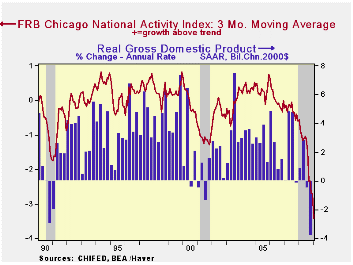 Global| Feb 23 2009
Global| Feb 23 2009Chicago Fed Index Fell Further
by:Tom Moeller
|in:Economy in Brief
Summary
The January National Activity Index (CFNAI) from the Chicago Federal Reserve Bank remained depressed at -3.45 after December's level of -3.65. The December figure was revised lower from the initial estimate and the latest numbers were [...]

The three-month moving average of the index of -3.41 was its lowest since January of 1975.
An index level at or below -0.70 typically has indicated negative U.S. economic growth. A zero value of the CFNAI indicates that the economy is expanding at its historical trend rate of growth of roughly 3%.
The complete CFNAI report is available here and the historical data are available in Haver's SURVEYS database.
Each of the four sub-categories of the index including employment, production, income, consumption & housing made a negative contribution to the January index. Sixty two of the individual indicators in the overall series made negative contributions while twenty three made a positive contribution.
The CFNAI is a weighted average of 85 indicators of economic activity. The indicators reflect activity in the following categories: production & income, the labor market, personal consumption & housing, manufacturing & trade sales, and inventories & orders.
In a separate survey, the Chicago Fed indicated that its Midwest manufacturing index fell during December to its lowest level since late 1996. Indicators for the steel, machinery, resource and auto sectors each fell.
The Chicago Federal Reserve figures are available in Haver's SURVEYS database.
Today's Joint Statement by the Treasury, FDIC, OCC, OTS, and the Federal Reserve can be found here.
| Chicago Fed | January | December | January '08 | 2008 | 2007 | 2006 |
|---|---|---|---|---|---|---|
| CFNAI | -3.45 | -3.65 | -0.55 | -1.77 | -0.37 | 0.01 |
| 3-Month Average | -3.41 | -2.70 | -0.55 | -- | -- | -- |
Tom Moeller
AuthorMore in Author Profile »Prior to joining Haver Analytics in 2000, Mr. Moeller worked as the Economist at Chancellor Capital Management from 1985 to 1999. There, he developed comprehensive economic forecasts and interpreted economic data for equity and fixed income portfolio managers. Also at Chancellor, Mr. Moeller worked as an equity analyst and was responsible for researching and rating companies in the economically sensitive automobile and housing industries for investment in Chancellor’s equity portfolio. Prior to joining Chancellor, Mr. Moeller was an Economist at Citibank from 1979 to 1984. He also analyzed pricing behavior in the metals industry for the Council on Wage and Price Stability in Washington, D.C. In 1999, Mr. Moeller received the award for most accurate forecast from the Forecasters' Club of New York. From 1990 to 1992 he was President of the New York Association for Business Economists. Mr. Moeller earned an M.B.A. in Finance from Fordham University, where he graduated in 1987. He holds a Bachelor of Arts in Economics from George Washington University.
More Economy in Brief
 Global| Feb 05 2026
Global| Feb 05 2026Charts of the Week: Balanced Policy, Resilient Data and AI Narratives
by:Andrew Cates






